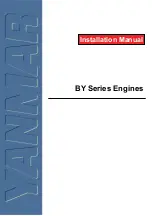
MAINTENANCE - 1B - 7
90-816462 2-695
GASOLINE/ALCOHOL BLENDS
Many new motor vehicle owner manuals are warning
about the potential damage from using gasoline con-
taining alcohol, especially METHANOL. They cite
possible fuel system damage and performance prob-
lems. These are just two of the hazards that may be
caused by alcohol. These same problems as well as
the additional safety risk of fire and explosion from
fuel system leaks apply to marine inboard engines.
METHANOL is more severe in its bad effect than is
ETHANOL. Alcohol is also more severe in older en-
gines since newer engines have materials which are
more resistant to alcohol.
EFFECTS OF GASOLINE/ALCOHOL BLENDS
ON MARINE ENGINES
Corrosion of metals may result from use of
alcohol-gasoline blends. Portable or permanently
installed fuel tanks of metal or fiberglass, fuel filters,
fuel lines and float bowls may be affected by alcohol
blended fuels. Many fiberglass fuel tanks are slowly
dissolved by alcohol, leading immediately to filter and
carburetor plugging and eventually to tank failure.
Fuels containing alcohol will absorb moisture from
the air. At first, this moisture will remain in solution, but
once the water content of the fuel has built up to about
one-half of one percent, it will separate out (phase
separation), bringing the alcohol with it. This alco-
hol-water mixture settles to the bottom of the fuel tank
and if this mixture gets into the engine, the engine can
be seriously damaged internally, as it may wash the
protective film of oil off the bore of any cylinder that it
enters. Before the engine can be restarted, it is nec-
essary to remove the separated alcohol and water
layer, flush out the fuel system with clean fuel and re-
move and dry the spark plugs.
BOAT/MOTOR STORAGE
When operating a MerCruiser engine on gasoline
containing alcohol, storage of gasoline in the fuel tank
for long periods of time should be avoided.
Long periods of storage, common to boats, create
unique problems. In cars, gasoline/alcohol blend
fuels normally are consumed before they can absorb
enough moisture to cause trouble, but boats often sit
idle long enough for phase separation to take place.
In addition, internal corrosion may take place during
storage if alcohol has washed protective oil films from
internal components.
WINTER STORAGE
If boat is to be placed in winter storage, carburetors
must be run dry at idle RPM. Permanent fuel tanks
should be drained completely and Quicksilver Gaso-
line Stabilizer and Conditioner added to any fuel re-
maining in the tank. Portable fuel tanks should be
emptied completely.
WARRANTY
Performance problems and fuel system or other dam-
age resulting from the use of gasoline-alcohol
blended fuels are not the responsibility of MerCruiser
and will not be covered under our warranty.
CONTINUING EVALUATIONS
The effects of gasoline with ETHANOL and
METHANOL are still being evaluated by the United
States Coast Guard, the National Marine
Manufacturers Association (NMMA), Mercury Marine
and other engine and boat manufacturers.
We have recommended pump posting of alcohol
content of gasoline. Further we recommend using
gasoline known not to contain any METHANOL or
ETHANOL when possible.
TEST FOR ALCOHOL CONTENT IN GASOLINE
The following is an acceptable and widely used field
procedure for the detection of alcohol in gasoline.
Use any small transparent bottle or tube that can be
capped and is, or can be, provided with graduations
or a mark at about 1/3 full. A pencil mark on a piece of
adhesive tape may be used.
Procedure:
1. Fill the container with water to the mark.
2. Add fuel almost to fill the container, leaving some
air space, then cap the container. The proportions
of fuel to water are not critical, but there should be
2 to 3 times as much fuel as water.
3. Shake container vigorously and allow it to sit up-
right for 3 to 5 minutes. If the volume of water
appears to have increased, alcohol is present. If
you are not sure, there is no need for concern. If
the dividing line between water and fuel becomes
cloudy, use the middle of the cloudy band.
Содержание 13
Страница 1: ...13 Printed in U S A 90 816462 2 695 1995 Brunswick Corporation GM 4 Cylinder MARINE ENGINES ...
Страница 2: ...90 816462 2 695 0 ...
Страница 7: ...1 A IMPORTANT INFORMATION GENERAL INFORMATION 72000 ...
Страница 15: ...1 B 50617 IMPORTANT INFORMATION MAINTENANCE ...
Страница 36: ...1 C IMPORTANT INFORMATION TROUBLESHOOTING ...
Страница 74: ...2 A 50633 REMOVAL AND INSTALLATION 4 CYL ALPHA ONE DRIVE ...
Страница 88: ...3 A 26790 ENGINE 181 CID 3 0L 4 CYLINDER GM ENGINE ...
Страница 137: ...4 A 72079 ELECTRICAL SYSTEMS STARTING SYSTEM ...
Страница 170: ...4 B 71855 ELECTRICAL SYSTEMS IGNITION SYSTEM ...
Страница 197: ...ELECTRICAL SYSTEMS CHARGING SYSTEM 4 C 72078 ...
Страница 237: ...4 D 72747 ELECTRICAL SYSTEMS INSTRUMENTATION ...
Страница 250: ...4 E 72938 ELECTRICAL SYSTEMS WIRING DIAGRAMS ...
Страница 264: ...5 A FUEL SYSTEM FUEL PUMP ...
Страница 271: ...5 B 72681 FUEL SYSTEM MERCARB 2 BARREL CARBURETOR ...
Страница 300: ...6 A 50628 COOLING SYSTEM SEAWATER COOLED MODELS ...
Страница 309: ...6 B 73665 COOLING SYSTEM CLOSED COOLING MODELS ...
Страница 325: ...C 6 EXHAUST SYSTEM MANIFOLD ...
Страница 331: ...7 A 71317 POWER STEERING PUMP ...
















































